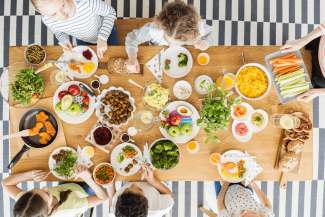Building a healthy relationship with food

Food is everywhere! It is ubiquitous at so many day-to-day occasions that we develop many different relationships with it. Unfortunately for many of us, the food interaction is a complicated relationship. It can trace back to how food was presented when we were younger, watching our parents’ or friends’ relationships with food, or even to habits that we’ve built up over the years. So how do you know if yours is a healthy relationship?
A healthy relationship looks like enjoying each meal you eat and simply enjoying food overall, instead of making you feel guilty. Besides nourishing our bodies, food give us a certain feeling. So when we eat, we should be more aware of the cues that our body gives us. Are we feeling hunger or fullness? It’s recognizing cravings for what they are and indulging with moderation and when it makes sense.
In the other hand, an unhealthy relationship with food looks just the opposite. It is eating, and then having feelings like guilt, remorse, anger or bitterness. It is being unable to recognize the signals from our body that let us know when it is hungry and when it is full. We either indulge all cravings, or completely ignore them and feel guilty for having them.
To nip this scenario in the bud and create a healthy relationship with food once and for all, we need to change our mindset and stop focusing on a “diet” regimen. This word has an important meaning and needs to be properly used. Unfortunately, it has been almost universally abused and, in many cases, used incorrectly. So today, we encourage people to create healthy habits that are not restrictive, unless there is a medical condition or recommendation that mandates a limited diet.
Allow yourself unconditional permission to eat all foods. If it’s Monday and you are craving ice cream, go for it! In the mood for a sandwich at lunch? Allow it. Want a salad for dinner? You have permission to eat that too. Let’s focus more on moderation rather than restriction. Not allowing certain foods - even subconsciously - creates a certain pedestal for those foods that leads you to constantly think about that particular food. Let’s say you tell yourself that you’re not allowed to have cookies. Likely, you start thinking about cookies all day, every day, to the point where cookies become so tempting that all you want is to have them. Once you do get the chance to eat cookies, most likely you will eat a lot of them too quickly and you won’t even enjoy it. In fact, you’ll probably feel guilty. So, you tell yourself you can’t have cookies anymore. And, the cycle continues.
Therefore, by giving yourself unconditional, nonjudgmental permission to eat all foods, you can actually ask yourself if you really want a given food or not, since you know that if you don’t want it now, you have permission to eat it any other time you like. When you allow yourself permission to eat any food, any time, you’ll eventually find that you start to crave a mix of different food groups and nutrients. Of course, this transition can take time, so my best advice is to be patient with yourself. If you need support, don’t hesitate to speak with a professional who can guide you and help you build a healthy relationship with food.
